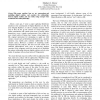Free Online Productivity Tools
i2Speak
i2Symbol
i2OCR
iTex2Img
iWeb2Print
iWeb2Shot
i2Type
iPdf2Split
iPdf2Merge
i2Bopomofo
i2Arabic
i2Style
i2Image
i2PDF
iLatex2Rtf
Sci2ools
89
Voted
ECIS
2000
2000
Modelling in the Digital World - An Anti-Realist Perspective
This paper considers how we are constructing and modelling digital realities, and considers the relationships between digital realities and our reality using concepts from traditional anti-realist philosophy. About a year ago, I wrote a paper applying Berkeleian idealism to the construction of Digital Realities [1]. By the term "Digital Realities", I refer to computer systems which even if they do not go the extreme of virtual realities or online communities still contain some sense of reality within themselves; even a simple word-processor lives within its own virtual reality of button bars, menus, virtual paper etc. My original motivation for attempting to apply an 18th century concept such as Berkeleian idealism [2] to a modern construct was mainly pure curiosity (philosophy in the strictest sense). However a number of surprising results emerged from this analysis. The first was how useful even outdated philosophical tools were in analysing modern concepts in the computer ...
Related Content
| Added | 01 Nov 2010 |
| Updated | 01 Nov 2010 |
| Type | Conference |
| Year | 2000 |
| Where | ECIS |
| Authors | Matthew J. Dovey |
Comments (0)

